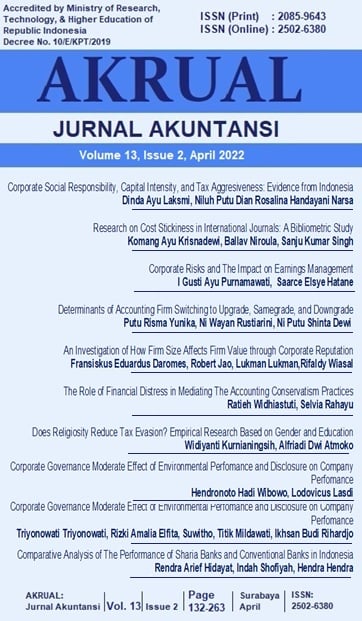Does Religiosity Reduce Tax Evasion? Empirical Research Based on Gender and Education
DOI:
https://doi.org/10.26740/jaj.v13n2.p213-226Keywords:
Money Ethics, Religion, Tax Evasion, Gender, Education LevelAbstract
Tax evasion in Indonesia there are still many cases, even though the law clearly regulates taxation procedures, there are still many taxpayers who do not carry out their obligations by taking tax evasion measures. The purpose of this study was to empirically examine the effect of money ethics on tax evasion and the interaction effect of religiosity on the relationship between money ethics and tax evasion. This study also aims to test empirically the differences in the levels of the three variables based on the perspective of gender and education level. This research method uses simple regression analysis and used moderated regression analysis to test the effects of interaction and to test differences in gender perspectives and education levels on these three variables using independent sample t-test analysis. The results of this study are that money ethics has a positive effect on tax evasion, there is an interaction effect on the relationship between money ethics and tax evasion, there are differences in religiosity and tax evasion from a gender perspective, there is no difference in money ethics from a gender perspective and there is no difference in money ethics, religiosity and, tax evasion from the perspective of education level.
References
Chitchai, Senasu, & Sakworawich. (2018). The Moderating Effect of Love of Money onRelationship between Socioeconomic Status and Happiness. Humanitarian and SocioEconomic Sciences Journal, 10.
Ghozali, I. (2011). Aplikasi Analisis Multivariate Dengan Program IBM SPSS 19 (5th ed.). Semarang: Universitas Diponegoro.
Heider, F. (1958). Psikologi Hubungan Interpersonal. New York: Wiley.
Lau, T.-C., Choe, K.-L., & Tan, L.-P. (2013). The Moderating Effect of Religiosity in the Relationship between Money Ethics and Tax Evasion. Asian Social Science, 9(11). https://doi.org/10.5539/ass.v9n11P213
Rosianti, C., & Mangoting, Y. (2015). Pengaruh Money Ethics terhadap Tax Evasion dengan Intrinsic dan Extrinsic Religiosity sebagai Variabel Moderating. Tax & Accounting Review, 4(1), 61. Retrieved from http://publication.petra.ac.id/index.php/akuntansi-pajak/article/view/3101
Sekaran, U., & Bougie, R. J. (2016). Research Method for Business: A Skill-Building Approach (7th ed.). Wiley & Son.
Tang, T. L. P., Kim, J. K., & Tang, D. S. H. (2000). Does Attitude Towards MoneyModerate the Relationship Between Instrinsic Job Satisfaction and Voluntary Turnover ? Human Relations, 53(2).
Widiyaningrum, A. (2014). Penentu Persepsi Etika Mahasiswa Akuntansi. Jurnal Ilmiah Mahasiswa FEB, 2(2).
Zain, M. (2008). Manajemen Perpajakan. Jakarta: Salemba Empat.
Downloads
Published
How to Cite
Issue
Section
License
Copyright (c) 2021 AKRUAL: Jurnal Akuntansi

This work is licensed under a Creative Commons Attribution-NonCommercial 4.0 International License.
 Abstract views: 879
,
Abstract views: 879
, PDF Downloads: 1252
PDF Downloads: 1252


















